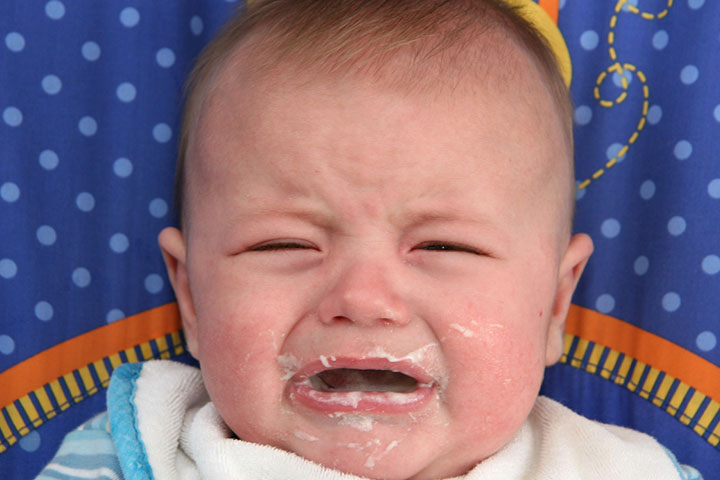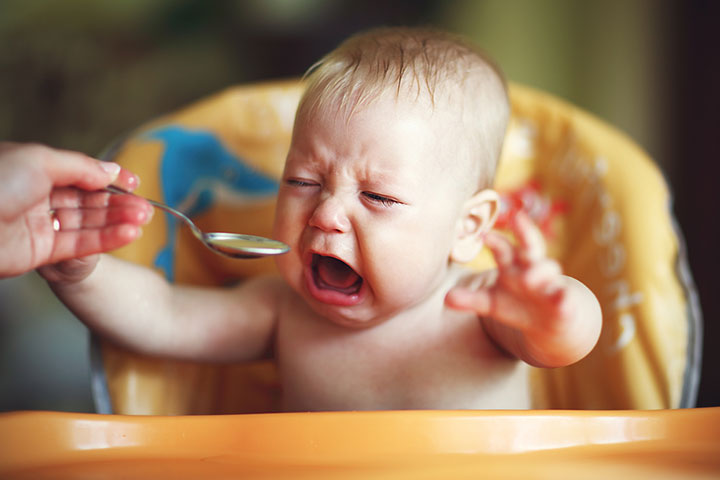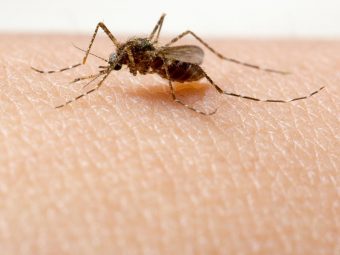
Image: Shutterstock
Breastfed babies often spit up thin milky fluid, while formula-fed babies spit up a type of material that looks like cottage cheese. However, if you see your baby spitting up blood, you might be extremely worried as a concerned parent.
Spitting up fluids through the nose and mouth is pretty common in babies. But if you see your tiny tot spitting up bright brown or red blood alongside milky fluid, you may be alarmed.
Spitting up blood may not always be an indicator of a medical condition in babies. If your baby is active and healthy, it is highly unlikely that an underlying condition is the reason for them spitting up blood. However, it is wise to consult a pediatrician and get a thorough checkup. Read on to know the common causes of babies spitting up blood and when to be concerned.
Is It Normal For Babies To Spit-up Blood?
Image: IStock
Spitting-up of blood is definitely a concern in babies, whetherneonatesiXNewborns less than four weeks oldor infants.Neonates may spit-up of red or pink-tinged flecks could be due to swallowed maternal blood during delivery. This happens in the first few days after delivery. For older breastfeeding babies, bloody vomit could be due to the ingesting maternal blood or swallowing blood from cracked and sore nipples. But in both cases that is flecks of blood.
Causes Of Baby Spitting Up Blood
There could be several reasons why the baby spits up blood. The severity of it may also vary from baby to baby.
1. Cracked and sore nipples
Image: IStock
In mostbreastfeeding babies, the blood thebaby spits upis usually from the mother and not from the baby’s body system(1). It can happen if you have sore or cracked nipples. It is common for nursing moms, especially those who have just started nursing to experience irritation in the nipples due to the pulling and pressure, or because of the exposure of skin to saliva. It may turn so bad that the skin cracks and bleeds. It subsides with the healing of nipples.
Most of the time, a healthy breastfeeding infant who spits up a little blood would have swallowed it from the mother’s sore nipple. The blood irritates the tummy, and it regurgitates. If you do not see any crack, try to express some milk and check if it emits a blood tinge. However, the blood is streaks of blood, neverfrank bloodiXVisible presence of blood in stool. Always check the mother’s nipples for cracks.
If you observe blood in your breast milk or on your nipple, offer some sugar water or plain water to your婴儿喂养后, so that the blood clears away from their tummy. Stop feeding through the cracked nipple for a few days until it heals. You can use anipple shieldiXA breastfeeding tool shaped like a shield placed over the nipples, which is available in pharmacies, to avoid irritation to the healing nipple. You can still breastfeed your baby from the same breast.
The blood that passes with the breast milk will also mix with the food in the intestine, and sometimes result in the appearance of bloody stools.
If you find no blood from the nipple, or if your baby is on formula feed and you can still find them spitting blood, your baby should be immediately taken to the doctor.
2. Swallowed blood during delivery
如果你的宝宝出生后不久就吐了血,there is nothing to worry about.It may be the maternal-fetal blood your baby might have swallowed during delivery(2). The blood usually subsides after one or two days, but if it continues to come, consult a doctor.
 Did you know?
Did you know?3. Forceful spitting up
Image: IStock
In rare cases, your baby may forcibly spit up, causing a tiny tear in the blood vessel present in the esophagus. It is nothing of worry again, as it heals quickly with time(3).
4. Esophagitis
It is an inflammation that damages the tissues in the esophagus, the muscular tube that delivers food from the mouth to the stomach(4).This sometimes occurs as a medication side effect when the baby is given medicines, such as anti-inflammatories or antibiotics, causinggastritisiXInflammation of the stomach lining.
 Nutrition fact
Nutrition factWhen To Call The Doctor?
Image: Shutterstock
If none of the above causes are the reasons behind your baby spitting up blood, and if it continues to persist, you should take them to a pediatrician.
If your baby is having symptoms likegreen vomitingiXVomit with bile and is usually green or greenish-yellow in color,abdominal distentioniXSwelling of stomach, fever, or lethargy, reluctance to feed, you need to seek immediate medical care. Blood spit-up due togastrointestinaliXRelating to the stomach and intestineissues could be a sign of a major underlying medical concern, such as gastrointestinal bleeding or hematemesis (a condition marked by vomiting blood) (in rare cases).
Tips To Reduce Spitting Up In Babies
Image: IStock
Follow some simple tips to bring down the frequency of your baby spitting up(5):
1. Burp your baby
Take time to burp your baby after each feeding session. It can keep the air from building up in yourbaby’s stomachand avoid spit-ups.
2. No physical activity
Keep your baby upright for at least 30 minutes after every feed. Avoid immediate active play or use of swings. Also avoid pressing on a baby’s belly (tummy time) right after eating.
4. Small and frequent feedings
Try smaller and frequent feeding sessions. As the baby’s stomach is small, do not overfeed him in a single session.
 Quick tip
Quick tip常见问题
1. Does spit-up mean overfeeding?
Babies spitting up milk after feeding can often be related to overfeeding breastmilk or formula(3).
2. Why is my baby spitting up purple?
When a baby spits up blood, it is concerning to a parent. A baby spitting up blood could be due to benign or concerning reasons. If your baby is spitting up blood, consult a pediatrician to know the exact cause. Also, note if you have sore or cracked nipples as the baby may accidentally follow blood from there, thus giving the impression of spitting up blood. You may also try the above tips to ensure the baby is not strained after feeding, which could help avoid forceful blood-spitting.
Infographic: Babies Spitting Up Blood: Signs You Should Not Ignore
Babies spitting up blood could be a concerning sight for parents; however, when they do this occasionally, it may not be due to a serious pathological condition. Nevertheless, contact a pediatrician instantly if your baby is spitting up blood too often and has additional symptoms, such as those listed in this infographic.

Illustration: Momjunction Design Team
Get high-quality PDF version by clicking below.
Download Infographic
Key Pointers
- Spitting up red or pink-tinged specks may result from the mother’s painful nipples or from swallowing maternal blood during delivery.
- Spitting up blood in babies can also be caused by forceful spitting up and esophagitis.
- Burping after every feeding, using a nipple shield if the mother has sensitive nipples, and refraining from giving the baby medications that could result in esophagitis are all ways to lessen spitting up in babies.
- A pediatrician should be consulted if the baby continues to spit up blood, exhibits symptoms like fever, lethargy, or green vomiting, or if the blood does not stop after a few days.
Gain insights about why your baby is spitting up, when you should be concerned about it and tips to help contril the same.
References:
2.Vomiting in neonates; Victorian Agency For Health Information
3.Spitting Up – Reflux; Seattle Children’s
4.Esophagitis in Children; Boston Children’s Hospital
5.Why Babies Spit Up; Healthy Children; American Academy of Pediatrics
6. Florence van Hunsel et al.; (2016);(Es)omeprazole and Discoloration of Regurgitated Gastric Contents in Infants: Worrying for Care-Takers and a Sign of a Reduced Bioavailability; National Library Of Medicine
7. M H Moustafa et al.; (2005);“My two-week-old daughter is throwing up blood”; National Library Of Medicine
8.What is esophagitis?; Boston Children’s Hospital
9.Why is my baby spitting up so much breast milk?; Texas Children’s Hospital.





















